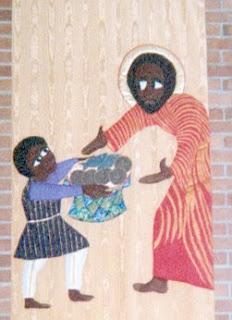The time between worship services at Christ Church, Zionsville was set aside for a conversation among our members who attended this pulpit exchange event, adults from Christ Church, and me. It was a good opportunity for us to get to know each other in a small-group, semi-formal setting. (No matter how relaxed, I find Q & A sessions to be not quite informal.)
Someone offered that “all the advice” he’s read about how to grow churches, by attracting new members, suggests the veterans will have to change more than a few practices to make new-comers feel welcome. What, the questioner wanted to know, is First Trinity prepared to do to make that happen?
I’m not completely pleased with my response. I recall rambling on about ministry in a multi-cultural setting. But there were a few points worth thinking about more thoroughly.
I noted, first, that worship needs to be relevant to those in attendance. Relevant is much different than trendy. Trends follow fads, like using power point computer presentations during the sermon. Relevant means that what’s done at worship must connect with those who would worship God. Somehow, the “natural” ways they speak, act, dress, sing - or not, have to have a place of honor if their worship is to be authentic and genuine (both a gift to them [from God], and a gift from them [to God].
Second, I said, while worship “forms” might be new / different, and / or unfamiliar, the point of worship is all about giving God thanks and praise for the ways God keeps making us new (creating); getting us through (saving); and, bringing us over (blessing) - over into the ways of God’s will and God’s work. Who we worship and why we worship isn’t new at all. That is, this is what God has been doing from the beginning, and what God will keep doing forever. (That’s what we mean when we say that God is unchanging, always the same.)
Of course, change always involves both loss and gain. Often, the gain is less easy to see. Sadly, especially in communities of faith - and particularly about worship - the gain is measured against some “cost-benefit analysis” that’s personally owned rather than broadly shared.
I heard a DJ tell his audience, “You really need to hear the sounds we’re playing during the noon hour. Just tell the folks you had church on the radio today.” Well, you can have a lot of experiences over the radio - meditation, entertainment, uplift, powerful praise, but you cannot have church - and you definitely cannot have worship.
Looking at the latter, worship is the public activity / work of the community of faith who are called, gathered and equipped by the Holy Spirit. Radio, even in a crowded room lacks both of these. In its place a community offers God thanks for all who God has been and all that God has done in the week just past. In a second counter-cultural move, those gathered thank God - in advance – for who God will be and what God will do in the week ahead.
I’m eager to be led by God’s Spirit to find folks who are being called by God to explore how worship might happen among homogenous groups – like jazz musicians; 20 – 30 something’s into hip-hop; poets; even public intellectuals. These folks, either maintaining their focus identity, or mixing it up, have much to teach about how God wants us to join God’s work in our everyday worlds, fueled and fed by our gathering together in worship.
Luther believed that the work of a pastor’s "priesthood" is easy. Folks expect us to break-open the Word and speak a prayer. The harder “priesthood” to make real occurs in worldly settings, by those who hold regular jobs. Luther said it something like this: The shoemaker’s awl (needle) is his Gospel (text); his sanctuary is his shop.
Once we’ve changed the way we worship together, changing how we BE and DO church together will be quite natural.
Wednesday, October 04, 2006
Subscribe to:
Post Comments (Atom)




No comments:
Post a Comment